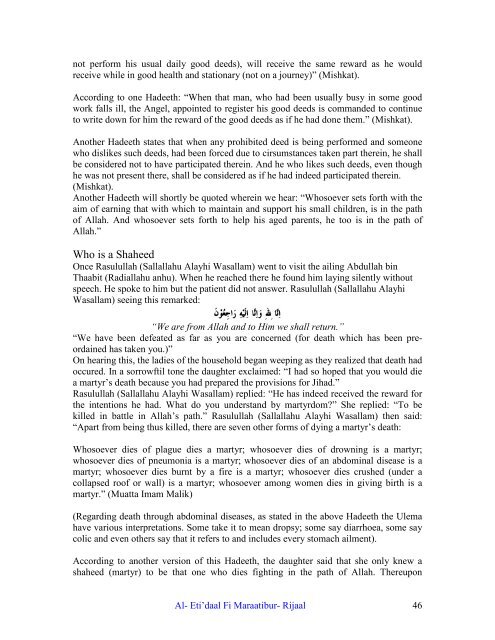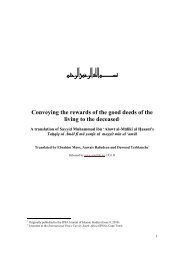al_etidaal_gn
al_etidaal_gn
al_etidaal_gn
Create successful ePaper yourself
Turn your PDF publications into a flip-book with our unique Google optimized e-Paper software.
not perform his usu<strong>al</strong> daily good deeds), will receive the same reward as he would<br />
receive while in good he<strong>al</strong>th and stationary (not on a journey)” (Mishkat).<br />
According to one Hadeeth: “When that man, who had been usu<strong>al</strong>ly busy in some good<br />
work f<strong>al</strong>ls ill, the Angel, appointed to register his good deeds is commanded to continue<br />
to write down for him the reward of the good deeds as if he had done them.” (Mishkat).<br />
Another Hadeeth states that when any prohibited deed is being performed and someone<br />
who dislikes such deeds, had been forced due to cirsumstances taken part therein, he sh<strong>al</strong>l<br />
be considered not to have participated therein. And he who likes such deeds, even though<br />
he was not present there, sh<strong>al</strong>l be considered as if he had indeed participated therein.<br />
(Mishkat).<br />
Another Hadeeth will shortly be quoted wherein we hear: “Whosoever sets forth with the<br />
aim of earning that with which to maintain and support his sm<strong>al</strong>l children, is in the path<br />
of Allah. And whosoever sets forth to help his aged parents, he too is in the path of<br />
Allah.”<br />
Who is a Shaheed<br />
Once Rasulullah (S<strong>al</strong>l<strong>al</strong>lahu Alayhi Was<strong>al</strong>lam) went to visit the ailing Abdullah bin<br />
Thaabit (Radi<strong>al</strong>lahu anhu). When he reached there he found him laying silently without<br />
speech. He spoke to him but the patient did not answer. Rasulullah (S<strong>al</strong>l<strong>al</strong>lahu Alayhi<br />
Was<strong>al</strong>lam) seeing this remarked:<br />
“We are from Allah and to Him we sh<strong>al</strong>l return.”<br />
“We have been defeated as far as you are concerned (for death which has been preordained<br />
has taken you.)”<br />
On hearing this, the ladies of the household began weeping as they re<strong>al</strong>ized that death had<br />
occured. In a sorrowftil tone the daughter exclaimed: “I had so hoped that you would die<br />
a martyr’s death because you had prepared the provisions for Jihad.”<br />
Rasulullah (S<strong>al</strong>l<strong>al</strong>lahu Alayhi Was<strong>al</strong>lam) replied: “He has indeed received the reward for<br />
the intentions he had. What do you understand by martyrdom?” She replied: “To be<br />
killed in battle in Allah’s path.” Rasulullah (S<strong>al</strong>l<strong>al</strong>lahu Alayhi Was<strong>al</strong>lam) then said:<br />
“Apart from being thus killed, there are seven other forms of dying a martyr’s death:<br />
Whosoever dies of plague dies a martyr; whosoever dies of drowning is a martyr;<br />
whosoever dies of pneumonia is a martyr; whosoever dies of an abdomin<strong>al</strong> disease is a<br />
martyr; whosoever dies burnt by a fire is a martyr; whosoever dies crushed (under a<br />
collapsed roof or w<strong>al</strong>l) is a martyr; whosoever among women dies in giving birth is a<br />
martyr.” (Muatta Imam M<strong>al</strong>ik)<br />
(Regarding death through abdomin<strong>al</strong> diseases, as stated in the above Hadeeth the Ulema<br />
have various interpretations. Some take it to mean dropsy; some say diarrhoea, some say<br />
colic and even others say that it refers to and includes every stomach ailment).<br />
According to another version of this Hadeeth, the daughter said that she only knew a<br />
shaheed (martyr) to be that one who dies fighting in the path of Allah. Thereupon<br />
Al- Eti’da<strong>al</strong> Fi Maraatibur- Rija<strong>al</strong> 46




